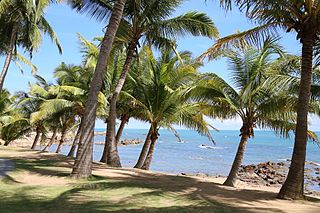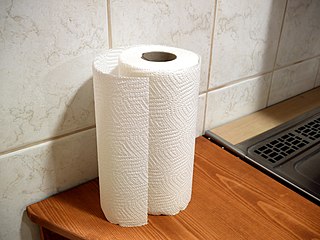
Hainan is the smallest and southernmost province of the People's Republic of China (PRC), consisting of various islands in the South China Sea. Hainan Island, the largest and most populous island in China, makes up the vast majority (97%) of the province. "Hainan", the name of the island and the province, literally means "south of the sea", reflecting its position south of the Qiongzhou Strait, which separates it from Leizhou Peninsula. Hainan is officially known as Hainan Island.

Pulp is a lignocellulosic fibrous material prepared by chemically or mechanically separating cellulose fibers from wood, fiber crops, waste paper, or rags. Mixed with water and other chemical or plant-based additives, pulp is the major raw material used in papermaking and the industrial production of other paper products.

A paper towel is an absorbent, disposable towel made from paper. In Britain, paper towels for kitchen use are also known as kitchen rolls, kitchen paper, or kitchen towels. For home use, paper towels are usually sold in a roll of perforated sheets, but some are sold in stacks of pre-cut and pre-folded layers for use in paper-towel dispensers. Unlike cloth towels, paper towels are disposable and intended to be used only once. Paper towels soak up water because they are loosely woven, which enables water to travel between the fibers, even against gravity. They have similar purposes to conventional towels, such as drying hands, wiping windows and other surfaces, dusting, and cleaning up spills. Paper towel dispensers are commonly used in toilet facilities shared by many people, as they are often considered more hygienic than hot-air hand dryers or shared cloth towels.

The Lenzing Group is an international group with its headquarters in Lenzing, Austria, and production sites in all major markets. Lenzing produces wood-based viscose fibers, modal fibers, lyocell fibers and filament yarn, which are used in the textile industry - in clothing, home textiles and technical textiles - as well as in the nonwovens industry. In addition, the company is active in mechanical and plant engineering. The Lenzing Group markets its products under the brand names TENCEL, VEOCEL, LENZING ECOVERO and LENZING.

The kraft process (also known as kraft pulping or sulfate process) is a process for conversion of wood into wood pulp, which consists of almost pure cellulose fibers, the main component of paper. The kraft process involves treatment of wood chips with a hot mixture of water, sodium hydroxide (NaOH), and sodium sulfide (Na2S), known as white liquor, that breaks the bonds that link lignin, hemicellulose, and cellulose. The technology entails several steps, both mechanical and chemical. It is the dominant method for producing paper. In some situations, the process has been controversial because kraft plants can release odorous products and in some situations produce substantial liquid wastes.

The South Region of Brazil is one of the five regions of Brazil. It includes the states of Paraná, Rio Grande do Sul, and Santa Catarina, and covers 576,409.6 square kilometres (222,553.0 sq mi), being the smallest region of the country, occupying only about 6.76% of the territory of Brazil. Its whole area is smaller than that of the state of Minas Gerais, in Southeast Brazil, for example.
Sinar Mas is one of the largest conglomerates in Indonesia. It was formed in 1938. It has numerous subsidiaries including Asia Pulp & Paper and palm oil producer PT SMART. The company also acquired Berau Coal Energy from Asia Resource Minerals PLC, a major mining group founded by Nathaniel Philip Rothschild, in a takeover initiated by Fuganto Widjaja.

The recycling of paper is the process by which waste paper is turned into new paper products. It has a number of important benefits: It saves waste paper from occupying homes of people and producing methane as it breaks down. Because paper fibre contains carbon, recycling keeps the carbon locked up for longer and out of the atmosphere. Around two-thirds of all paper products in the US are now recovered and recycled, although it does not all become new paper. After repeated processing the fibres become too short for the production of new paper - this is why virgin fibre is frequently added to the pulp recipe.

Tissue paper or simply tissue is a lightweight paper or, light crêpe paper. Tissue can be made from recycled paper pulp on a paper machine.

Haikou Meilan International Airport is the airport serving Haikou, the capital of Hainan Province, China. It is located 25 kilometres (16 mi) southeast of the city center and was opened in 1999, replacing the old Dayingshan Airport located along what is now the city's Guoxing Avenue. The airport is operated by Hainan Meilan International Airport Company Limited.
The Sartell Paper Mill, officially the Verso Paper Sartell Mill, was a paper mill located in the city of Sartell in the U.S. state of Minnesota, operating from 1905 until a disastrous explosion in 2012.

Asia Pulp & Paper (APP) is an Indonesian pulp and paper company based in Jakarta, Indonesia. One of the largest pulp and paper companies in the world, it was founded as Tjiwi Kimia by Eka Tjipta Widjaja in 1972. Asia Pulp & Paper is a subsidiary of Sinar Mas Group and was officially formed in 1994 when Sinar combined its paper and pulp operations from Tjiwi Kimia and PT Inda Kiat Pulp & Paper.

Asia Pacific Resources International Holdings Limited, or APRIL, is a developer of fibre plantations and the owner of one of the world's largest pulp and paper mills with operations mainly in Indonesia and China. APRIL mainly produces bleached hardwood kraft pulp and uncoated, wood-free paper, including its Paperone brand of office paper. Founded in 1993, APRIL is managed by Royal Golden Eagle and owned by Indonesian business man Sukanto Tanoto living in Singapore. Royal Golden Eagle also manages companies in paper, palm oil, construction, and energy business sectors.

The environmental effects of paper are significant, which has led to changes in industry and behaviour at both business and personal levels. With the use of modern technology such as the printing press and the highly mechanized harvesting of wood, disposable paper became a relatively cheap commodity, which led to a high level of consumption and waste. The rise in global environmental issues such as air and water pollution, climate change, overflowing landfills and clearcutting have all lead to increased government regulations. There is now a trend towards sustainability in the pulp and paper industry as it moves to reduce clear cutting, water use, greenhouse gas emissions, fossil fuel consumption and clean up its influence on local water supplies and air pollution.

Joint Stock Company Kondopoga is a Russian pulp and paper production company located in the Republic of Karelia. It is currently the largest in Russia and 7th biggest in Europe newsprint producer with an annual output of 710 tpy. Headquartered in the city of Kondopoga, the company has 7,657 employees. It has two wholly owned subsidiaries and five affiliated companies. The company's stock is traded at the Russian Trading System.
Chemrec AB (Chemrec) is a Stockholm, Sweden-based company with comprehensive experience of pioneering the development of black liquor gasification (BLG) technology for energy and chemicals recovery at pulp mills.
Royal Golden Eagle is global integrated, resource-based industrial group, with businesses in paper, palm oil, viscose, construction and energy, property and asset management. Owned by Indonesian businessman Sukanto Tanoto, the group employs 60,000 people worldwide with assets exceeding US$25 billion.
The history of papermaking in New York had its beginnings in the late 18th century, at a time when linen and cotton rags were the primary source of fibers in the manufacturing process. By 1850 there were more than 106 paper mills in New York, more than in any other state. A landmark in the history of papermaking in the United States was the installation of the first Fourdrinier machine in the country at a mill in Saugerties, New York, in 1827. Papermaking from ground-wood pulp began in New York in 1869, with the establishment of the Hudson River Pulp & Paper Company in Corinth and also with the work of Illustrious Remington and his sons in Watertown. The innovation and success of the Remingtons spurred further development of the industry in the state.

Great Northern Paper Company was a Maine-based pulp and paper manufacturer that at its peak in the 1970s and 1980s operated mills in Arkansas, Georgia, Maine, and Wisconsin and produced 16.4% of the newsprint made in the United States. It was also one of the largest landowners in the state of Maine.
Hemp paper is paper varieties consisting exclusively or to a large extent from pulp obtained from fibers of industrial hemp. The products are mainly specialty papers such as cigarette paper, banknotes and technical filter papers. Compared to wood pulp, hemp pulp offers a four to five times longer fibre, a significantly lower lignin fraction as well as a higher tear resistance and tensile strength. Because the paper industry's processes have been optimized for wood as the feedstock, production costs currently are much higher than for paper from wood.














